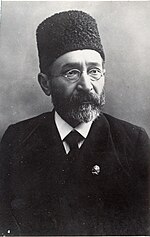Najaf bey Vazirov
This article needs additional citations for verification. (May 2023) |
Najaf bey Vazirov | |
|---|---|
 | |
| Born | 17 February 1854 |
| Died | 9 July 1926 (aged 72) |
| Occupation(s) | Forest warden, lawyer, playwright, journalist |
Najaf bey Fatali oglu Vazirov (Azerbaijani: Nəcəf-bəy Vəzirov) (17 February 1854 – 9 July 1926) was an Azerbaijani playwright and journalist.
Life
Vazirov was born in
In 1868, despite his mother did not wanted him to leave, he came to Baku. His mother wanted him to remain in his previous position because life could have been more comfortable for him. His mom used to work and earned money. Upon coming to Baku, he was accepted to school because he was smart. He stayed in Baku for a year and lived with his relatives. A year later, he was given a scholarship and was provided with a place to live. He graduated from a gymnasium (secondary school) in Baku with a silver medal. In 1873, when he was in the sixth grade, for the first time he went to a Russian theater. He admired the play. The next day he asked his gymnasium professor called "Hasanbay Malikov" whether were there any Azerbaijani theater plays. Malikov found a play called "Haci Qara" by the author "Mirza Fatali Akhundov". He decided to the comedy play in his school together with other Azerbaijani students. Every day after dinner, they rehearsed the play. His professor "Hasanbay Malikov" used to help during the rehearsals. There were lot of people in the day of play as well as the mayor of Baku "Staroselski" where everybody enjoyed the play. After the play the secretary of the mayor "Hasanbay Habibbayov" made a banquet for the students. That night his professor " Hasanbay Malikov" sent a congratulatory letter to "Mirza Fatali Akhundov" who was the author of the original play. "Mirza Fatali Akhundov" replied with a two page long letter stating that he was very content. The last two years when he was studying in the gymnasium he started to give lessons. Gymnasium gave him a room where he taught lessons until the noon where later on he was studying. Even though he became weaker because of studying too much, he was still working hard. When he finished the gymnasium he had 600 manats.
Vazirov got admitted to the
By that time Vazirov had already written several dramatic pieces, mostly comedies reflecting the everyday life of contemporary students and families. Starting from the 1890s Vazirov's liberal views on politics start influencing his works. Vazirov continues the tradition initiated by
Vazirov's works significantly enriched the repertoire of the then young Azerbaijani theatre and decisively established realistic genre as the dominant one in the Azerbaijani drama.
The Lankaran State Drama Theatre is named after Najaf bey Vazirov.
References
- ^ (in Russian) Najaf bey Vazirov Archived 2007-09-27 at the Wayback Machine. Axtar.az
- ^ (in Russian) Azerbaijani Literature by Garayev et al.
